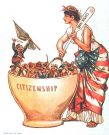The Farewell Address Reflects Federalist Party Policy Rather than the Constitution
The Rosenkranz Debate concerned the truth of John Adams’ quotation: The Constitution is designed for a moral and religious people and it’s wholly unfitted for the government any other. My friend, Professor Robert George, relied primarily on George Washington’s Farewell Address for historical evidence. There Washington, like Adams, claimed religion was important, if not essential, to sustaining the Republic. For instance, Washington famously said, “Let us with caution indulge the supposition that morality can be maintained without religion. Whatever may be conceded to the influence of refined education on minds of peculiar structure, reason and experience both forbid us to expect that national morality can prevail in exclusion of religious principle.”
But Washington’s Farewell Address provides an uncertain guide as to whether the Framers of the Constitution thought widespread religious belief necessary to sustain it. As I noted in my opening remarks at the debate, the text of the Constitution does not support this view. It does not establish any particular religion or even require belief in a religion of one’s choice. It instead expressly prohibits all religious tests for offices under the United State Constitution.
Moreover, it is dangerous to rely too much on the words of politicians in political strife to establish much about the Constitution. And as great as George Washington was he was still a politician, and as powerfully stated is his Farewell address, it is in large measure a document reflecting the principles of the Federalist party. His remarks on religion parallel one of key attacks of the Federalists on the Democratic Republicans–that they were deists, like the dreaded French Revolutionaries, or at least no friends of traditional religion.
To be sure, Washington’s First Administration was largely above party politics, including as it did both Alexander Hamilton and Thomas Jefferson. But by the end of his Second Administration, Washington was identified with the Federalist party. His cabinet was composed entirely of men of Federalist disposition. Many of his policies, like that embodied in the Jay Treaty, were subject to quite vicious attack by Jefferson and his supporters.
Washington was not a man of infinite patience and he was angered by the impugning of his honor. Thus, the Farewell Address provides a defense of his political legacy, all the more persuasive for not being written in obviously partisan terms. For instance, he alludes to his Neutrality Proclamation, which provides an example of his warning against foreign entanglements. Similarly, he defends treaties into which his administration entered by broadly confirm the capacity of the federal government to deepen national unity. He attacks parties, but this assault should be seen as an attempt to place his political principles as beyond party. Most politicians like to portray their principles that way.
Confirmation that his encomium to religion may be a part of a distinctively Federalist platform is that it does not appear in the first draft of his address. Written by James Madison at the time of the end of his First Administration, that simpler draft was prompted by an earlier inclination to resign after a single term. Moreover, as I discussed in my talk, before the rise of conflict between Federalist and Democratic Republicans, Alexander Hamilton, the ghostwriter of the later draft, had argued that the Constitution must be built on man’s passions rather than morality or religion.
Thus, like the quotation of John Adams, Washington’s reflections on religion flow more from the political divisions of his time rather than from the thinking that inspired the Constitution.


